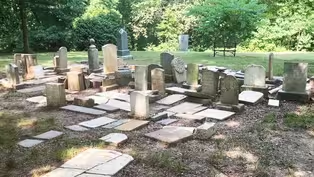
Ketanji Brown Jackson reflects on path to Supreme Court
Clip: 9/3/2024 | 12m 48sVideo has Closed Captions
Ketanji Brown Jackson reflects on her groundbreaking path to Supreme Court in new memoir
Supreme Court Justice Ketanji Brown Jackson is out with a new memoir chronicling her family’s rise from segregation to her confirmation as the first Black woman on the nation's highest court, all in a single generation. Geoff Bennett sat down with Justice Jackson in New York to discuss "Lovely One."
Problems playing video? | Closed Captioning Feedback
Problems playing video? | Closed Captioning Feedback
Major corporate funding for the PBS News Hour is provided by BDO, BNSF, Consumer Cellular, American Cruise Lines, and Raymond James. Funding for the PBS NewsHour Weekend is provided by...

Ketanji Brown Jackson reflects on path to Supreme Court
Clip: 9/3/2024 | 12m 48sVideo has Closed Captions
Supreme Court Justice Ketanji Brown Jackson is out with a new memoir chronicling her family’s rise from segregation to her confirmation as the first Black woman on the nation's highest court, all in a single generation. Geoff Bennett sat down with Justice Jackson in New York to discuss "Lovely One."
Problems playing video? | Closed Captioning Feedback
How to Watch PBS News Hour
PBS News Hour is available to stream on pbs.org and the free PBS App, available on iPhone, Apple TV, Android TV, Android smartphones, Amazon Fire TV, Amazon Fire Tablet, Roku, Samsung Smart TV, and Vizio.
Providing Support for PBS.org
Learn Moreabout PBS online sponsorshipAMNA NAWAZ: Supreme Court justice# Ketanji Brown Jackson is out with## a new memoir chronicling her family's# rise from segregation to her confirmation## as the first Black woman on the nation's# highest court, all in a single generation.
Geoff Bennett spoke with Justice Jackson earlier# today in New York about her memoir, "Lovely One."
GEOFF BENNETT: Justice Jackson, thanks so# much for speaking with us.
We appreciate it.
KETANJI BROWN JACKSON, U.S. Supreme Court# Associate Justice: Thank you for having me.
GEOFF BENNETT: This book, your memoir, what# comes through is how your .. uniquely American story, a real powerful# testament to this country's progress.
And you write about how your parents# are the products of segregation,## but they poured into you -- and what# strikes me about your story is that## they poured into you with such powerful and# purposeful effort and deliberate intention.
What values did they impart that# really helped guide your life## and your professional journey?
JUDGE KETANJI BROWN JACKSON: Well,## as I said, thank you for having me and giving me# the opportunity to talk about the book and talk## about my parents, who really did instill values# like hard work and love of country, love of self.
They had fierce pride in our African American# identity, which comes up in my name.
The book is## called "Lovely One" because that is the English# translation of my African name, given name,## Ketanji Onyika.
And my parents, you know, I just# wanted to be so much like them when I was little.
My father went back to law school when I was 3,## 4 years old.
And I remember him studying.# And that was one of my earliest memories.## And my parents were educators originally when# I was born.
And so the idea of the importance## of education and working hard and striving to# achieve something all come from my parents.
GEOFF BENNETT: As the first Black woman# to serve on the U.S. Supreme Court,## how do you perceive your role in the broader# context of American history and progress?
JUDGE KETANJI BROWN JACKSON: Well,# it definitely demonstrates progress,## I think.
So many people have received# my appointment in that light.
I'm the first Black woman, as you say, but not the## first Black woman who could have done this# job.
I think about Constance Baker Motley,## who I talk about in the book and who was# a role model for me.
She was the first## African American federal judge.
And she argued# something like 11 cases in the Supreme Court.
But she grew up and came up in a# time in which it wouldn't have been## possible for her to be appointed to# the court.
And so I feel so fortunate## to be in this position.
And it shows the# progress that we have made as a country.
GEOFF BENNETT: What does being# a first mean in practical terms?
JUDGE KETANJI BROWN JACKSON: Well, I think it# means that we are moving now to a time in which## anyone has the opportunity to do what they want# to do in our society.
And I hope that seeing my## appointment would be motivational for children,# just like Judge Motley was motivational for me.
GEOFF BENNETT: How do you# engage with the other justices?
Justice Breyer, as I understand it, he# used to like to go to other justices## chambers and have direct conversations.# Others prefer written communication.
How## do you do it and how do you navigate# differences in legal interpretation?
JUDGE KETANJI BROWN JACKSON:# I think a little bit of both.
I learned from Justice Breyer, who, as you# say, was a great collaborator, as someone## who really did like to gauge personally with# the other justices.
Sometimes, I go around.
But I think we probably mostly communicate# by memo and also by phone.
And you do your## best to try to persuade people that you have# the better of the argument, or at least the## way that you're thinking about it is the way# the court should approach a particular issue.
GEOFF BENNETT: You have at times aligned# in your opinions with Justice Neil Gorsuch.
But, for the most part, you're part# of a three-justice liberal minority.## How do you grapple with at times# having limited ability to sway the## outcomes of consequential,# oftentimes divisive cases?
JUDGE KETANJI BROWN JACKSON:# Well, I'm an optimist at heart.
JUDGE KETANJI BROWN JACKSON: And you look at# every case and you do your best to ask the## questions at oral argument that you think might# get people thinking.
And you do your best through## your clerks and other members of your staff# to communicate with them to your position.
And you also hear their position and try# to understand where they're coming from to## bridge whatever differences there are.
But I'm# not going to lie.
It's not easy, to be sure.
JUDGE KETANJI BROWN JACKSON:# But I'm always of the belief## that people are persuadable.
And# that's what I'm here to try to do.
GEOFF BENNETT: Has that worked?
JUDGE KETANJI BROWN JACKSON: In some cases, yes.
I mean, the court is a deliberative# body.
And our duty and our job is to## listen to one another and try# to come to the best decision.
GEOFF BENNETT: How do you think the court is# best positioned to maintain the public trust?
JUDGE KETANJI BROWN JACKSON: Well,# maintaining the public trust is a## very important aspect of the court's# work.
This is something that Justice## Breyer talks about all the time, and# when I was clerking for him, now.
It's one of his big themes, that the court,# unlike the other branches of government,## doesn't have an army and it doesn't have power of# the purse, and so we really do have to persuade## people that the court is trustworthy in order# to ensure that the rule of law is maintained.
I think the court needs to# -- I can tell you what I do,## really focus on the role of the court in a# democratic society.
We have a constitutional## republic.
There are other branches of# government.
And so I'm really focused## on ensuring that I am staying in my lane in my# decisions and in the cases that come before us.
I'm thinking about consistency across# the various cases, regardless of who## brings the claims at issue.
And I am working# diligently to set aside my personal views,## as I did as a lower court judge and# as a judge on the Court of Appeals.
GEOFF BENNETT: On the matter of# court ethics you have said that## you are open to proposals to implement an# enforceable code of ethics for justices.
President Biden has also urged# the adoption of an 18-year term## limit for the justices.
Should there be# term limits for Supreme Court justices?
JUDGE KETANJI BROWN JACKSON: Well,# here's how I'm thinking about that.
There have been debates about term limits since# the beginning of our republic.
I talk about## this in the book a little bit.
Alexander# Hamilton debated the anti-federalists as## to whether or not judges should have lifetime# appointments, and the constitutional process## was such that he won that debate, and# that's what we have now in our system.
And so it's a political process to make# a determination as to whether or not## that should be changed.
And in our democracy,# people are engaging in that debate right now.
GEOFF BENNETT: The idea, though, as President# Biden has suggested, that it's a good thing to## have more consistency in this process and that# 18 years, as he suggested, is a good approach?
JUDGE KETANJI BROWN JACKSON: Well, I'm# going to let the political process play out.
And people are engaged in this decision right now,# and it'll be interesting to see what we decide.
GEOFF BENNETT: The court's recent rulings# on voting rights, reproductive rights,## presidential immunity, in your view, how have# those rulings fundamentally changed American life?
JUDGE KETANJI BROWN JACKSON: Well, the court# hears some of the most significant cases.
That's the role of the court in our constitutional# design.
We take issues that are difficult,## because, if they weren't difficult, they wouldn't# make their way all the way to the Supreme Court.## And many of those issues, as you have indicated,# deal with pretty complicated social issues.
There are standards in the law for# when we decide to make changes.
The## court generally follows precedent.
But# there are times in which those standards,## according to a majority of the justices,# have been met and changes are made.
GEOFF BENNETT: You have written some pretty# forceful, pointed dissents in some major cases,## to include a 29-page dissent sharply criticizing## the ruling to reject affirmative# action in college admissions.
And you wrote that: "Deeming race# irrelevant in law does not make## it so in life."
And you also wrote# that time would reveal the effects.
We're already getting our first look at# the apparent impact.
MIT, Amherst College,## Tufts University report a significantly# lower number of Black students this year,## as white enrollment increases.
What do# you think are the implications of that?
JUDGE KETANJI BROWN JACKSON: Well, I will# leave it to your viewers to read my opinion.
In my dissent, I talked about the gaps that# have been created in our society over time## and the fact that affirmative action# was initially designed as a response## to them.
And so we will have to see what# happens as a result of where we are now.
GEOFF BENNETT: When you write a dissent,## who do you envision as the audience?
Is it the# Americ.. JUDGE KETANJI BROWN JACKSON: All of the above.
You really do try to speak to a wide variety# of audiences, because, when you're dissenting,## obviously, you have not been able to persuade# your colleagues about your view of the issue.
So,## to some extent, you are writing for the public,## so that they can understand the debate# that the justices have had about the issue.
And then you hope to be writing for posterity,## because you would hope that eventually# your point of view would prevail.
GEOFF BENNETT: The process of# writing a memoir, I imagine,## makes you think about your impact.
It's# probably too early to talk about your legacy.
GEOFF BENNETT: But what -- how do you# want to shape the court moving forward?
JUDGE KETANJI BROWN JACKSON: Oh, my goodness.
Well, I would just like to do a good j.. it's pretty early to be thinking about -- how# I'd change it or how I'd stamp it.
Right now,## I just want to do the best I can to serve the# American people to the best of my ability.
GEOFF BENNETT: Looking back at your# career thus far, what are you proudest of?
JUDGE KETANJI BROWN JACKSON: Oh, there's so# many things to be proud of.
I have talked## about all of the various stages of my life# in the book and the people who contributed.
I say in the preface, no one reaches the# highest of heights on their own.
And I## really believe that.
And so I think I'm proudest# of the relationships that have sustained me,## to include my wonderful husband, without whom I# don't think any of this would have been possible.
So I think it's the relationships that I have been## able to build and have been# privileged to be a part of.
GEOFF BENNETT: We got to see your parents## during the confirmation process.# What do they think of all this?
JUDGE KETANJI BROWN JACKSON: Oh, my goodness.
My parents are, I think, over-the-moon happy## and proud and just probably couldn't# have imagined that this would happen.
GEOFF BENNETT: Reading the book, though, I think# they could have.
I think they did imagine this.
(CROSSTALK) JUDGE KETANJI BROWN JACKSON: Maybe.
Maybe.
JUDGE KETANJI BROWN JACKSON: Well, they# certainly wanted something wonderful to## happen and felt that it could.
And# that's why they invested so much.
And I just -- I'm most pleased that# we were able to put everything down## on paper and have such a tribute to# them while they're still with us.
GEOFF BENNETT: The memoir is terrific... Justice Ketanji Brown Jackson, thank you so# much for speaking with me.
I appreciate it.
JUDGE KETANJI BROWN JACKSON: Thank you so much.
D.C. youth volunteer to preserve historic Black cemeteries
Video has Closed Captions
Clip: 9/3/2024 | 3m 30s | D.C. youth volunteer to preserve long-neglected and historic Black cemeteries (3m 30s)
Teachers, shopkeepers take up arms in Sudan's civil war
Video has Closed Captions
Clip: 9/3/2024 | 11m 37s | Sudanese teachers and shopkeepers join the fight against rebels in nation's civil war (11m 37s)
Trump makes election lies a key feature of his campaign
Video has Closed Captions
Clip: 9/3/2024 | 7m 28s | How Trump has made election lies a key feature of his campaign (7m 28s)
Zelenskyy pleas for long-range weapons after Russian strikes
Video has Closed Captions
Clip: 9/3/2024 | 3m 37s | Zelenskyy renews plea for long-range U.S. weapons after Russian strikes kill dozens (3m 37s)
Providing Support for PBS.org
Learn Moreabout PBS online sponsorship
- News and Public Affairs

FRONTLINE is investigative journalism that questions, explains and changes our world.

- News and Public Affairs

Amanpour and Company features conversations with leaders and decision makers.












Support for PBS provided by:
Major corporate funding for the PBS News Hour is provided by BDO, BNSF, Consumer Cellular, American Cruise Lines, and Raymond James. Funding for the PBS NewsHour Weekend is provided by...




